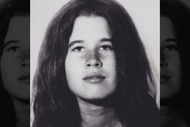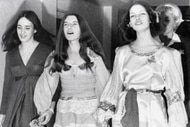Create a free profile to get unlimited access to exclusive videos, breaking news, sweepstakes, and more!
What Was Gwen Shamblin Lara's Actual Diet Plan From HBO Max's 'The Way Down'?
The new docuseries on The Remnant Fellowship and its leader, Gwen Shamblin Lara, depicts how she merged diet culture with theology.

HBO Max's new documentary, "The Way Down," takes a hard look at a Tennessee-based organization that combined a women's weight loss plan with strict Christian theology. But what were they really peddling?
Gwen Shamblin Lara's "The Weigh Down," which eventually became inextricably mixed with her religious group, The Remnant Fellowship, came out of both Shamblin's Christian upbringing and her training as a a dietitian.
"The Weigh Down," at its start in 1986, was a version of what became more widely known as intuitive eating after the 1995 publication of Evelyn Tribole and Elyse Resch's book "Intuitive Eating: A Revolutionary Program that Works." Tribole and Resch's work, which built on a (still-growing) consensus that so-called "diet culture" — which focuses on restricting food intake in order to lose weight — doesn't work in the long-term for most people. Instead, dietitians and others working to change the ways in which we perceive weight and so-called "healthy" eating through various intuitive eating programs encourage people to focus on why and when they eat, and to let go of ideas that certain foods or calorie counts are inherently bad.
In a certain way, Shamblin Lara had been far ahead of this curve when she started her "Weigh Down Workshops" in the mid-80s. At the time of its launch, she espoused that adherents should only eat when they were physically hungry — as evidenced by their stomachs growling — and that, any other time they wanted to eat, they should “run to God every time you want to go to food.”
She did correctly identify — as did Tribole and Resch and other dietitians — that part of why some people eat comfort foods too often or overeat is not because they always feel hungry, but because food is serving as an emotional solace. But whereas more traditional intuitive eating experts encourage people to let go of certain culturally driven ideas (like that some foods are either inherently "good" or "bad" and that eating them makes us "good" or "bad," too), Shamblin Lara ultimately embraced more of the black and white worldview of weight loss and food in which Americans are culturally ingrained and encouraged them to seek God when they wanted to emotionally eat.
She also used some Biblical phrases to underscore that God wanted her adherents to embrace certain foods. A 2001 New Yorker article quotes her as suggesting that certain passages from Exodus were God's way of discouraging leftovers, while the parable of the prodigal son was proof that God was pro-filet mignon.
Like her more traditional dietitian counterparts, she did try to discourage her clients and, eventually, church members — she and her first husband co-founded the Remnant Fellowship in 1999 and merged her weight loss program with its theology — to embrace the idea of enjoying rich foods in moderation. (Unlike traditional intuitive eating experts, she also discouraged exercise, though most dietitians work to help people find exercise regimens that work for their clients.) And, in her later years, she claimed that being skinny was a way to honor God, according to The Daily Beast.
Ultimately, the science of intuitive eating writ large and weight loss is divided: The Atlantic notes that studies show it doesn't work for short-term weight loss, but other research does show that it is very helpful to young women experiences body image issues, and that it can help people with the tendency to binge or emotionally eat. But most of its supporters also point to the fact that so many women suffer from disordered eating or disordered ideas about weight, weight loss and food — a 2008 study found that 75 percent of women engage in some disordered eating behaviors, the Atlantic wrote — that diet culture and its focus on thinness is likely doing more harm to people who want to lose weight than good.
Former members of Shamblin Lara's Remnant Fellowship — which remains ongoing under the direction of her daughter after its founder's untimely death last May — report that participation in Remnant and its Weight Down programming led them to suffer from eating disorders and mental health issues and led to allegations of child abuse against its founder, according to The Guardian.

























